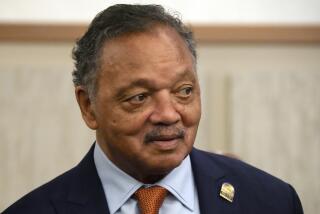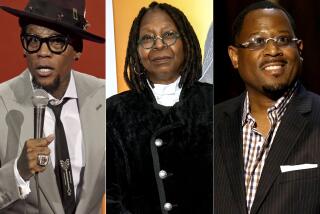Benjamin Hooks dies at 85; longtime NAACP leader
- Share via
Civil rights leader Benjamin L. Hooks, a lawyer, minister and pioneering judge who revived a flagging NAACP after he became its executive director in the late 1970s, has died. He was 85.
Hooks died Thursday at his Memphis home after a long illness, said Tennessee state Rep. Ulysses Jones, a member of the church where Hooks was pastor.
When Hooks took over leadership of the National Assn. for the Advancement of Colored People in 1977, it was $1 million in debt and had shrunk to 200,000 members from nearly half a million in the 1950s and 1960s.
“Black Americans are not defeated,” he told Ebony magazine soon after his induction. “The civil rights movement is not dead. If anyone thinks that we are going to stop agitating, they had better think again. If anyone thinks that we are going to stop litigating, they had better close the courts. If anyone thinks that we are not going to demonstrate and protest, they had better roll up the sidewalks.”
During the 1980s, he was “a powerful defender of the 1960s civil-rights victories against the assault of President Reagan’s policies,” The Times said in 1990.
In Washington, Hooks was often the point man, advocating government aid for the poor, affirmative action and laws that allowed recourse for victims of discrimination.
By the time Hooks stepped down in 1992, he and the NAACP had successfully pushed to enact a Civil Rights Act in 1991, extend the Voting Rights Act in 1982 and enact a Fair Housing Act in 1983. All passed despite White House opposition.
The organization’s membership had also rebounded, growing by several hundred thousand, according to the NAACP.
“Our national life is richer for the time Dr. Hooks spent on this Earth,” President Obama said in a statement. “And our union is more perfect for the way he spent it: giving a voice to the voiceless.”
In 2007, President George W. Bush presented Hooks with the Presidential Medal of Freedom, one of the country’s highest civilian honors.
“He never tired or faltered in demanding that our nation live up to its founding ideals of liberty and quality,” Bush said in 2007.
Benjamin Lawson Hooks was born Jan. 31, 1925, in a segregated Memphis.
His inspiration to fight social injustice and bigotry partly stemmed from his experience guarding Italian prisoners of war overseas while in the Army during World War II.
Prisoners were allowed to eat in “whites only” restaurants while he was barred from them.
He attended what is now LeMoyne-Owen College in his hometown and earned his undergraduate degree from Howard University in Washington, D.C.
When no law school in the South would admit him, Hooks attended DePaul University in Chicago, where he earned a law degree in 1948, and returned to Memphis, determined to fight racism, he later said.
“At that time you were insulted by law clerks, excluded from white bar associations and when I was in court, I was lucky to be called ‘Ben,’ ” he once told Jet magazine. “Usually it was just ‘boy.’ ”
In 1965 he was appointed to a new seat on the Tennessee Criminal Court, making him the first black judge since Reconstruction in a state trial court in the South.
Nominated by President Nixon, Hooks broke ground again as the first black member of the Federal Communications Commission in 1972.
At the FCC, he encouraged minority ownership of broadcast properties and actively promoted the employment of minorities in the broadcast industry.
After five years, he left to lead the NAACP, the nation’s oldest civil-rights organization.
During the Hooks era, the group worked with Major League Baseball and more than 200 corporations to expand employment opportunities for blacks.
In the early 1990s, Hooks and his family were among the targets of a series of racially motivated bombings, which helped persuade him to retire from the NAACP.
He later was chairman of the board of directors of the National Civil Rights Museum in Memphis and helped create the Benjamin L. Hooks Institute for Social Change at the University of Memphis.
Ordained as a minister in 1956, the gregarious Hooks preached regularly at Greater Middle Baptist Church until last year. During his final sermon, he broke into a gospel song.
Hooks is survived by his wife, Frances, a daughter and two grandsons.
More to Read
Start your day right
Sign up for Essential California for the L.A. Times biggest news, features and recommendations in your inbox six days a week.
You may occasionally receive promotional content from the Los Angeles Times.






